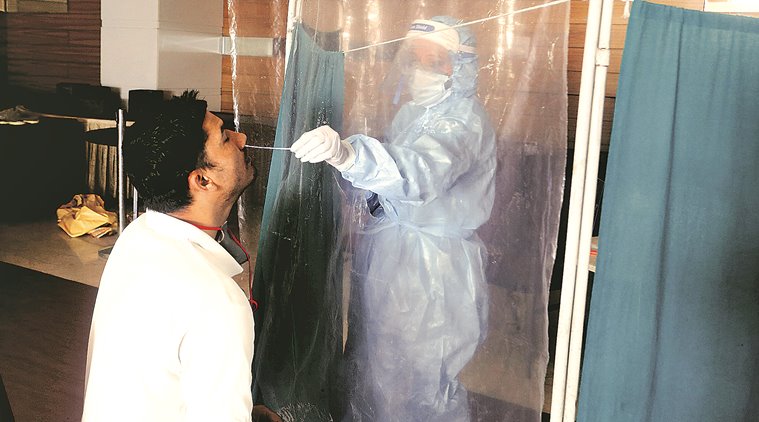 Of the 42 cases recorded in Jhajjar so far, two emerged on Sunday. (Representational)
Of the 42 cases recorded in Jhajjar so far, two emerged on Sunday. (Representational)
With 35 of the 42 COVID-19 cases in Jhajjar emerging from the two vegetable markets in the district, the administration has, in an endeavour to provide essentials to residents while preventing further spread of the infection, started purchasing vegetables from farmers and providing them directly to residents at their doorsteps.
According to data released by the district administration, seven cases emerged from the Jhajjar vegetable market and contacts of people working there, and 28 have emerged from among those working at the Bahadurgarh vegetable market and their contacts.
Officials have maintained that all employees of the two markets who tested positive used to purchase their wares from Azadpur Mandi in Delhi. While the market in Bahadurgarh has been sealed, the one in Jhajjar has been kept open for wholesalers, but has no takers in reality.
So, the administration Sunday launched a pilot project in Bahadurgarh city, wherein women associated with a self-help group, formed under the Haryana State Rural Livelihoods Mission, will deliver packages of essential vegetables to people’s doorsteps.
“Keeping in mind the number of cases emerging recently due to the connection between the Jhajjar and Bahadurgarh markets and Azadpur mandi in Delhi, these women will collect vegetables directly from farmers and provide them to people,” said Deputy Commissioner Jitendra Kumar.
Officials said a total of 31 women of the self-help group are participating in the endeavour, with one being deployed in each of the 31 wards of Bahadurgarh city. Apart from vegetables, the packages provided to people will also include face masks and hand sanitisers.
“The items being distributed will already be sorted and divided into packages, which people can purchase at a cost of Rs 100. This will ensure that there is no scope for extensive physical interaction, and will also make the process faster,” said a spokesperson of the Jhajjar district administration.
District Program Manager Yogesh Parashar added, “Twelve vehicles have been launched as part of the project in the first phase, which will cover the entire city. The health check-up of the women accompanying them will be carried out routinely, and they will be sent into the field only after thermal scanning.”
Of the 42 cases recorded in Jhajjar so far, two emerged on Sunday.
“One of those who tested positive today is a man who works at the Bahadurgarh vegetable market, while the other is a woman and a relative of a wholesaler at the Jhajjar vegetable market, who lives near the market itself. The wholesaler had also tested positive earlier, after which the sample of his relative had been taken for testing,” said Dr Randeep Poonia, Chief Medical Officer (CMO), Jhajjar.
Apart from the 35 cases associated with the markets, four who tested positive are relatives of a Delhi Police officer who tested positive in the capital; two are staff nurses employed at different hospitals; and one is a Bahadurgarh resident with a travel history of Maharashtra. All 42 cases emerged this week.